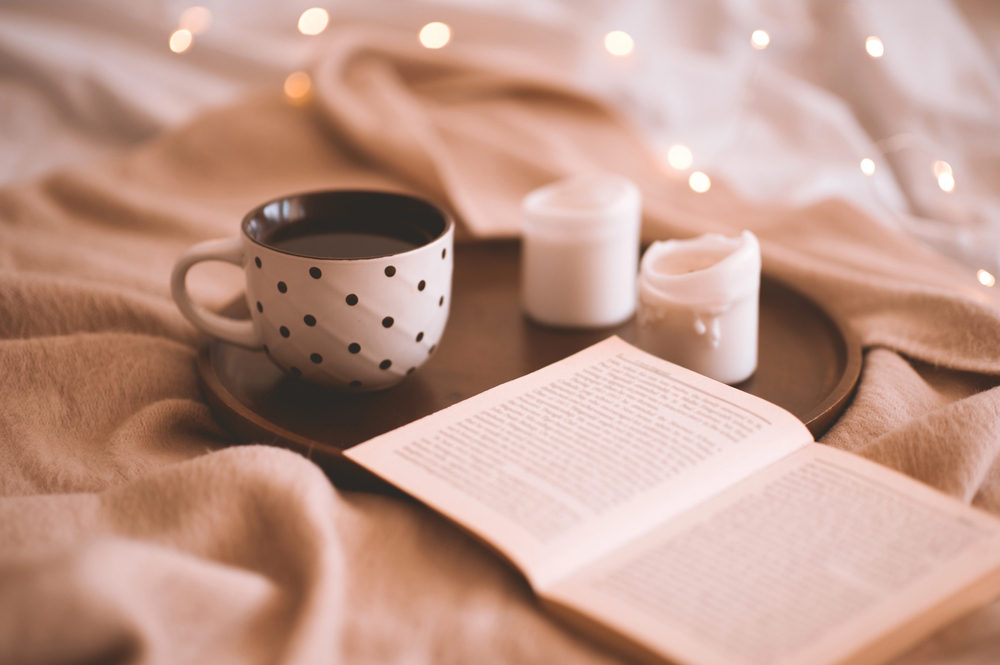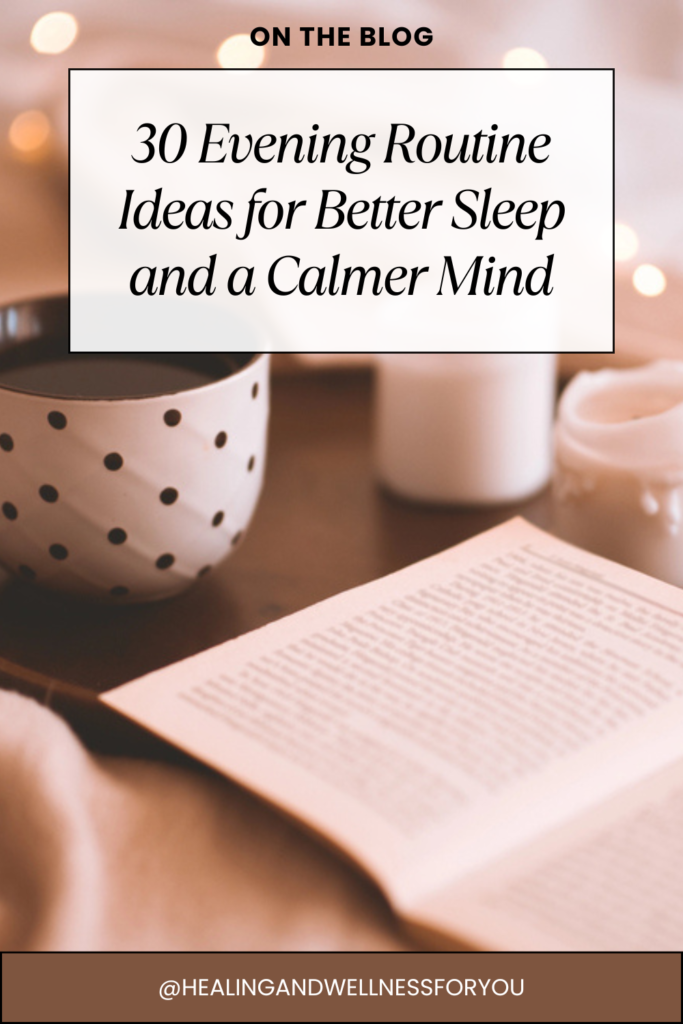30 Evening Routine Ideas for Better Sleep and a Calmer Mind
30 Evening Routine Ideas for Better Sleep and a Calmer Mind

Have you ever noticed that while you prioritize morning habits, you might overlook your evening routine?
I struggle with insomnia and wholeheartedly understand how challenging it can be to get a good night’s sleep. That’s why I’ve found establishing a consistent evening routine can be incredibly beneficial. It can help you unwind and prepare for rest, improving sleep quality. You’ll wake up rejuvenated and more prepared to tackle the day. Taking this time for yourself is important!
Many of us can relate to the struggle of evening habits that interfere with sleep. It’s tough when our sleep schedules vary by more than two hours from night to night, especially since about 40% of night owls experience this. These fluctuations can throw off our natural rhythms. The good news is that small changes to your nighttime routine can make a big difference in how you feel the next day. You’re not alone in this; there’s hope for better rest!
Whether you’re a morning person or a vampire, your evening routine should align with your personal needs while promoting healthy sleep.
Properly winding down helps create a transition between busy days and restful nights. This process doesn’t have to be complicated; even small, consistent habits can lead to notable benefits.
How Do I Plan My Evenings? Setting Up Your Evening Routine
A good evening routine is the secret sauce to sanity.
Start by deciding when your evening routine begins. This might be right after dinner or at a specific time, like 8:00 PM. Having a clear starting point helps us mentally transition.
Key Elements to Include:
- Time to review today and plan tomorrow
- Self-care activities
- Relaxation techniques
- Preparation for morning
Many people take time each night to plan for the next day. This simple habit gives clarity and makes the following day feel less daunting.
Try setting out tomorrow’s clothes and preparing lunch the night before. These small actions save precious morning time and reduce stress.
Digital sunset is another helpful practice. Turn off screens 1-2 hours before bed to help your brain produce melatonin naturally.
Our evening routine should be as thoughtful as our morning routine. Consider it the foundation for both restful sleep and a productive next day.
Be realistic with your routine. Start small with 2-3 consistent activities rather than trying to change everything at once.
Flexibility matters, too. Some evenings might need adjustments, and that’s perfectly okay!
30 Evening Routine Ideas for Better Sleep and a Calmer Mind
Creating a peaceful evening routine can help your mind unwind and prepare your body for restful sleep. I’ve gathered 30 simple yet effective ideas to help you craft the perfect evening routine.
Preparing Your Environment
- Control the light
- Find your ideal temperature
- Reduce noise
- Create a comfortable bed
- Remove electronic distractions
Practicing Mindfulness and Relaxation
- Start with deep breathing exercises
- Try a brief meditation session
- Practice a body scan
- Create a gradual ritual
- Disconnect from screens
Physical Relaxation Techniques
- Progressive muscle relaxation
- Evening stretching
- Deep breathing exercises
- Warm bath or shower
- Body scan meditation
Digital Detox and Unplugging
- Turn off screens 1 hour before bed
- Use blue light-blocking glasses in the evening
- Put your phone in another room
- Switch devices to night mode
- Set app limits or use a screen time tracker
Nourishing Your Body and Mind
- Enjoy a light, nutritious dinner
- Hydrate mindfully
- Create a tech-free zone
- Practice gentle movement
- Feed your mind positively
Planning and Reflecting
- Set clear intentions
- Use a time diary
- Create flexible routines
- Schedule reflection time
- Balance productivity and rest
Tips for Making Your Evening Routine Stick
Creating an evening routine is one thing, but sticking to it can be challenging. We all know how easy it is to let good habits slide when we’re taxed.
Start small and build gradually. Don’t try to change everything at once. Begin with just one or two habits and add more as these become second nature.
Setting a consistent time to begin your evening routine helps train your body and mind to wind down simultaneously each day.
Remember: It takes effort to break away from defaults that don’t serve us well. Many of us fall into patterns that just stick without thinking about them.
Try these practical tips to help your evening routine stick:
- Use visual reminders like sticky notes or phone alerts
- Prepare in advance by laying out items you’ll need
- Find an accountability partner to check in with
- Track your progress in a simple journal or app
I find that simple, structured routines are more likely to become habits.
Complicated plans often fall apart when we’re tired at day’s end.
Sometimes, life gets in the way of our plans. When this happens, we shouldn’t abandon our routine completely. Instead, we can do a shortened version to maintain consistency.
The effectiveness of a positive evening routine comes from repetition. Each time we engage with it; we build clarity and confidence for the following day.
Wrap-Up
The final step in your evening routine should be a fitting wrap-up that signals to your brain it’s time to rest. This can make all the difference in your sleep quality.
First, take a moment to look at tomorrow’s schedule. This will help clear your mind and prevent those midnight “I forgot about that meeting!” moments.
Next, try these quick wrap-up activities:
- Turn off all screens 30 minutes before bed
- Set out clothes for tomorrow
- Place your keys, wallet, and essentials by the door
- Fill your water bottle for the morning
- Write down 3 priorities for tomorrow
I find that creating a consistent wrap-up makes bedtime feel inevitable and natural, especially for families with children.
Remember to support your partner’s evening routine too! If they have their own wind-down rituals, respect their process even if it differs from yours.
My favorite wrap-up tip? A quick gratitude practice. Just naming one good thing from your day can shift your mindset from stress to contentment.
By wrapping up each day with a bit of care, we can set ourselves up for better mornings! Taking some time in the evening to reflect helps us unwind and makes it easier to wake up feeling recharged and ready for the day!

Frequently Asked Questions
Evening routines often raise questions about what works best for better sleep and productivity. Here are answers to some common questions I’ve received about creating effective nighttime habits.
What are some key steps to include in an evening routine for better sleep?
A good evening routine should start with gradually dimming lights in your home to signal your body that it’s time to wind down. This helps trigger your natural melatonin production.
Try to disconnect from electronic devices at least one hour before bed.
The blue light from the screens can interfere with your sleep cycle.
Include a relaxing activity, such as reading a physical book, gentle stretching, or meditation. These activities help calm your mind and prepare your body for rest.
Keep your bedroom calm, dark, and quiet. These environmental factors significantly impact sleep quality and how quickly you fall asleep.
Can you suggest a calming evening routine for managing stress?
Start your evening with a warm shower or bath about 90 minutes before bedtime. The temperature drop after bathing mimics your body’s natural cool-down before sleep.
Try journaling to release worries. Writing down tomorrow’s tasks or today’s accomplishments can prevent racing thoughts later.
Practice deep breathing or a 10-minute meditation. These techniques are especially helpful for clearing mental clutter and reducing anxiety.
Enjoy a cup of caffeine-free herbal tea, such as chamomile or lavender. These natural remedies can promote relaxation without disrupting sleep.
How can parents establish a consistent bedtime routine for their children?
Start your child’s bedtime routine at the same time each night. Consistency helps children’s bodies and minds prepare for sleep naturally.
Include calming activities like a warm bath, brushing teeth, and reading a story together. Keep the sequence the same each night to create predictability.
Limit exciting play and screen time at least an hour before bed. High-energy activities can make it harder for children to settle down.
Be patient—research shows that new bedtime routines may take about two weeks to show full benefits. Stick with it even if the results aren’t immediate.
What activities can be included in a student’s evening routine to enhance productivity?
Review your schedule and prepare the materials to plan for the next day. This will reduce morning stress and help your brain organize priorities.
Set out clothes, pack your bag, and prepare lunch the night before. These simple tasks save valuable morning time and mental energy.
Review notes or do light studying during your peak evening alertness. For many students, this falls between dinner and bedtime.
Create a dedicated wind-down period where you transition from work to rest. This helps signal to your brain that the productive part of your day is complete.
Could you share a basic checklist for a nighttime routine?
✓ Eat dinner at least 2-3 hours before bedtime to allow for proper digestion.
✓ Prepare for tomorrow by laying out clothes and packing necessary items.
✓ Dim lights throughout your home as the evening progresses.
✓ Complete your hygiene routine (wash face, brush teeth, etc.).
✓ Do a relaxing activity like reading or gentle stretching for 15-30 minutes.
✓ Set your alarm and place your phone away from your bed.
✓ Ensure your bedroom is cool (around 65-68°F/18-20°C) and dark.
Are there specific things to avoid doing before bedtime to ensure a good night’s rest?
Avoid caffeine at least 6 hours before bedtime. This includes coffee, tea, chocolate, and some medications that may contain hidden caffeine.
Skip intense exercise close to bedtime. While regular exercise improves sleep quality, vigorous workouts within 1-2 hours of sleep can be too stimulating.
Don’t use alcohol as a sleep aid. While it might help you fall asleep faster, it disrupts your sleep cycle and reduces overall sleep quality.
Avoid heavy, spicy, or fatty meals before bed. These foods can cause indigestion and make falling or staying asleep difficult.








